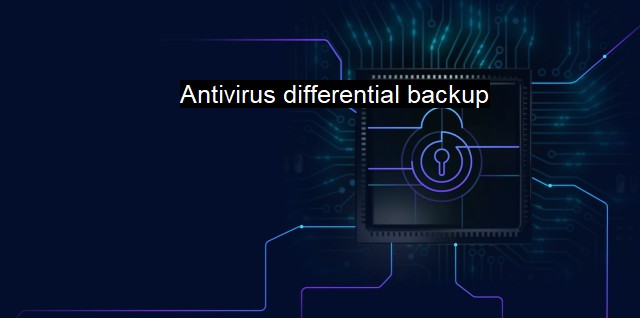What is Antivirus differential backup?
Enhancing Cybersecurity: The Critical Role of Antivirus Differential Backup
Antivirus Differential Backup represents a state-of-art technology used in data management and cybersecurity. Used widely across various systems for the primary purpose of backing up data, it falls into a crucial component of the digital world. Working alongside antivirus software, it allows a seamless experience of both data safety and system security, minimizing potential risks from viruses, malware, and other cyber threats.Before delving into the antivirus differential backup, it’s cardinal to understand the concept of backup in a technological context. A backup refers to the act of creating secondary copies of files, datasets or entire software, to ensure data availability even if it gets corrupted or accidentally deleted. It safeguards the user from unprecedented loss of critical data.
In simple terms, a differential backup forms a subset of the backup operations and involves the backing up of changes made to data since the last full backup, irrespective of how many differential backups have occurred in the interim, with all changes stored in one place.
Integrating antivirus software with differential backup enhances cybersecurity by fortifying it against malware attacks. Antivirus software, is a computer program designed to detect, prevent, and eliminate malicious software from the operating system. These malicious software, or 'malware', pose significant risk of data and privacy theft, system corruption, and even monetary losses in case of ransomware attacks.
Thus, an antivirus differential backup serves as an extra cover of protection by not just safeguarding from data loss, but ensuring the backup itself is free of malware and other threats. It works by performing scans on the files and data being backed up. If the antivirus identifies a threat, it eliminates or quarantines it before it's copied to the backup file, ensuring game-changing security of the digital assets.
Implementing an antivirus differential backup system aids in optimizing storage space as it backs up only the changes made since the last full backup. This significantly makes data recovery easier and quicker as it requires at most two backup sets (the full backup and the last differential backup) to restore the data, expediting the overall process.
It’s important to note that antivirus differential backups should form need to form part of a comprehensive layered cybersecurity strategy, and not the sole line of defence. Other safety measures could include utilizing a firewall, scheduling regular full system scans, frequent system patches and updates and instilling a robust VPN.
Beside personal or individual level protection, antivirus differential backup holds significant potential for businesses and organizations too, where the scale of data and sensitive information is massive. Even a minor data breach could lead to significant damages, potentially casting a company millions in financial losses, penalties, and harming their reputation horribly. Hence, the investment in such a sound cybersecurity measure can potentially save them heartache down the line.
It's critical to regularly update both the antivirus software and backup system, to keep them robust against-ever evolving threats in the cyber world. A regular audit to verify data integrity and the efficacy of the backup system, is a smart way to stay one step ahead in the game of digital preservation and protection.
An antivirus differential backup system acts as a sturdy shield against data loss when implemented appropriately. By providing a space-saving and efficient mechanism for data restoration, it rings a timely alarm against potential threats. Therefore, it's beneficial to keep this tool at the frontline of one's cybersecurity strategy in the progressing era of digital data and online threats.

Antivirus differential backup FAQs
What is antivirus differential backup and how does it work?
Antivirus Differential Backup is a cybersecurity mechanism that detects and backs up all the files on the system that have changed or modified since the last backup. This method saves time, storage space, and resources as it only copies the altered data, freeing up the system from redundant data.Why is Antivirus Differential Backup important for cybersecurity?
Antivirus Differential Backup safeguards your data by preserving the previous version of the files and preventing data loss due to any potential cyber attacks. In case of any malware attack, the differential backup helps in restoring the files to a previous version, minimizing the damage and recovery time.Can Antivirus Differential Backup replace antivirus software?
No, Antivirus Differential Backup cannot replace antivirus software as it only backs up the data, and does not actively protect your system against malicious software. Antivirus software is designed to scan and prevent any malware from entering the system, while differential backup takes snapshots of the data on the system.What are the limitations of Antivirus Differential Backup?
Some of the limitations of Antivirus Differential Backup include the need for frequent backups to ensure maximum protection of data, possibility of data corruption during the backup process, and the dependence on storage devices or cloud servers to store the backups. Other factors like insufficient storage capacity, slow backup speeds, or lack of proper configuration may also limit the effectiveness of the backup system.| | A | | | B | | | C | | | D | | | E | | | F | | | G | | | H | | | I | | | J | | | K | | | L | | | M | |
| | N | | | O | | | P | | | Q | | | R | | | S | | | T | | | U | | | V | | | W | | | X | | | Y | | | Z | |
| | 1 | | | 2 | | | 3 | | | 4 | | | 7 | | | 8 | | |||||||